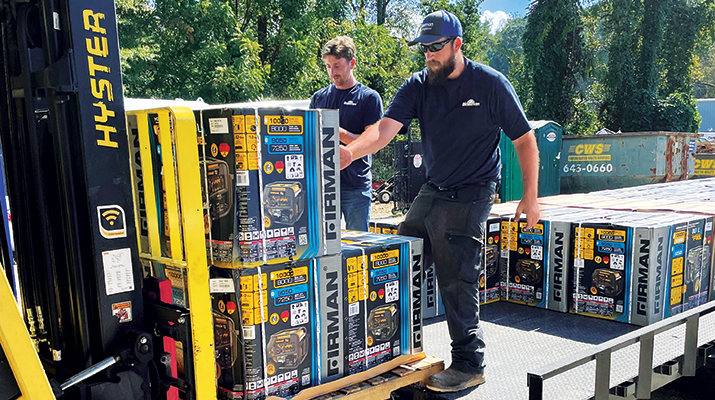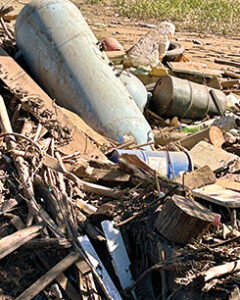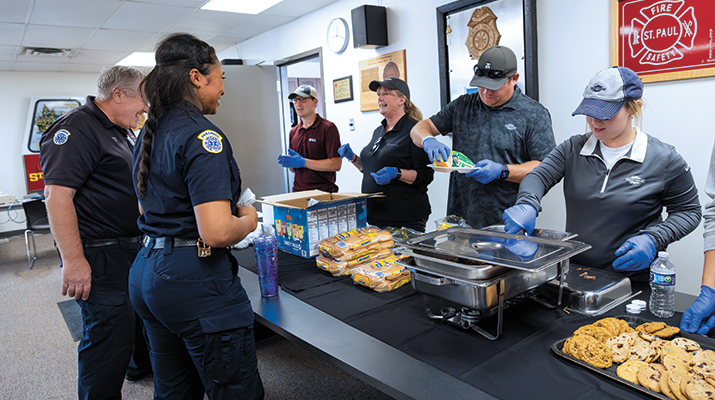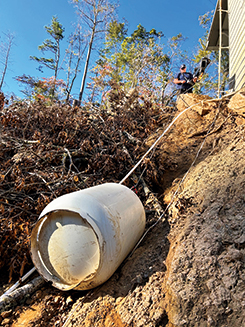Propane industry provides aid to areas devastated by hurricanes

Blossman Gas delivers propane generators to impacted areas. (Photo courtesy of Blossman Gas employees)
When deadly hurricanes and other dangerous weather events hit, the propane industry demonstrates its resilience not only in dealing with damage to its own operations, but through its support of the communities it serves.
The hurricanes caused hundreds of fatalities and widespread displacement. Tropical Storm Helene strengthened into a Category 4 hurricane, bringing damaging winds, severe flooding, storm surges and widespread power outages as it impacted Florida, Georgia, North Carolina and South Carolina in late September. Soon after, Hurricane Milton hit Florida as a Category 3 storm in early October, delivering another wallop to the southeastern corner – with more winds, tornadoes, flooding, power outages and property damage. Thousands of propane tanks and other equipment were damaged or lost in the storms.
Not only is propane critical to powering vehicles and generators that aid in recovery operations, but support from propane retailers has also proven indispensable, even as they bounce back from damage to their own operations.
LP Gas gives an overview here of the aftermath from these hurricanes on the industry, the support it has received and provided, and its plans to take on the looming winter season.
Tank damage, supply issues

Thousands of propane tanks were lost. (Photo courtesy of SEPA)
Strong wind gusts and up to 30 in. of rain in the mountains brought major damage to about 10 propane companies’ facilities in western North Carolina, John Jessup, president and CEO of the Southeast Propane Alliance (SEPA), says.
Companies lost bulk plants, bobtails, service trucks and a total of about 5,000 propane tanks. Some tanks from North Carolina were found 60 miles away in Tennessee.
“Many are only good for scrap now,” he adds.
Jessup estimates about $31.5 million in damage to infrastructure and vehicles, not including tanks at homes, and from labor and overtime expenses, in North Carolina alone.
As of Oct. 26, some employees of SEPA members were still without power and clean drinking water.
Blossman Gas, which serves 12 southeastern and mid-Atlantic states, contended with road closures caused by high levels of debris from the storms.
Emily Willis, Blossman’s vice president of marketing and public relations, says several of the company’s locations were impacted by power outages and road closures. Since Hurricane Katrina in 2005, however, Blossman has had a readiness plan in place that includes moving and relocating vulnerable assets, likely minimizing the damage the company experienced.
“We did lose one service vehicle to the storm and suffered some damage at three of our tank yards that has since been fixed,” Willis says. “As for customer tanks, we are currently counting around 100 that have been lost.”
Blossman’s branches are all operational and serving customers. There were, however, as of Oct. 17, still many impassable roads in the Asheville, North Carolina, area. The company worked with first responders to access unreachable areas.
Similarly, Ferrellgas team members say that power outages presented the greatest challenge, but extensive preparation and securement minimized damages and disruption to Ferrellgas and Blue Rhino facilities during the storms. One exception was a facility in Pinellas County, Florida, where the company is repairing some property damage.
In Florida, on top of property damages members have sustained, supply logistics challenges increased with Hurricane Milton, Dale Calhoun, executive director of the Florida Propane Gas Association, says. That is primarily because of lower propane supply and the need to deliver to a greater population in the impacted area, located primarily in the central and southern parts of the state.
Adding to the hurdle is that many customers undersize tanks for their generators due to cost. That puts a strain on deliveries, because so many generators in the state don’t have enough fuel, Calhoun says.
“They don’t have five- or six-days’ worth of [propane] in their tanks,” he explains. “Most people have [enough propane] for two to three days. And the tanks are never full going into a storm.”

Westmor was among the companies serving meals in St. Paul, Minnesota, as a way to honor first responders – an initiative led by the National Propane Gas Association’s Young Professionals Council. (Photo by Jase Wilts)
Providing critical support
Many companies distributed generators, water, food and cleaning supplies to communities in the first couple of weeks after the storms. Then, as the weather turned cold, that shifted to heaters, warm clothes, tents and sleeping bags. Additionally, the industry has donated or delivered more than 2,000 cylinders, Jessup says.
“Servicemen came out of retirement to help put systems back into operations. Offers from propane dealers in Georgia, South Carolina, New York, California, Indiana and Alabama have been much appreciated,” he says. “Propane tanks are still being delivered across rivers on rafts, rope bridges and ATVs to customers without roads or bridges to access the property.”
In the days following Hurricane Helene, Blossman contacted all employees in affected areas to confirm they were safe. Although all of the employees reported that they were OK, some lost homes, property and other valuables.
Ferrellgas also set up hotel and Airbnb locations to house employees who suffered damage to their homes or power outages, as well as staff brought in from a variety of service centers to help.
Blossman staff members who live in areas that weren’t impacted by the hurricanes pulled together to provide support to co-workers in need, Willis says.
Within two days of the storm, the propane retailer’s employees delivered generators and critical supplies not only to customers and communities, but also to their co-workers. Blossman’s research and development center in Asheville quickly became a supply room for employee families to get water, cleaning supplies and food.
Thanks to the propane industry’s efforts, Blossman employees as well as community members also had the comfort of a hot shower at the end of their long, difficult days, Willis says.
SEPA’s technical school, the Southeast Propane Alliance Technical Education Center, and staff from tankless water heater supplier Rinnai brought in freshwater tanks on Oct. 8 for pop-up showers for Blossman’s employees. Rinnai also provided shower shoes, soap and shampoo.
North State Gas Service donated over 750 gallons of fresh water, according to Matt Leonard, SEPA’s chief strategy officer. Gardner Marsh Gas Equipment Co. and LG Jordan Oil & Gas designed and assembled a portable hot water shower system capable of supplying water for laundry and eight shower units. The unit was assembled at Blossman’s staging area in Asheville for the community. SEPA’s membership planned a second portable unit to support recovery efforts in eastern Tennessee.
Blossman also worked with other propane companies in its service areas to help find tanks that were removed from their locations.
Willis points out that propane-powered vehicles and portable propane generators are critical to providing support during a natural disaster. Blossman, for example, was able to operate earlier than other companies in the area because it was fueling its vehicles with propane.
“Gasoline stations were completely out of fuel, but our vehicles could stay on the road and not be concerned about running out of fuel,” Willis notes.
Additionally, Blossman restored operation to all of its stores and helped critical infrastructure come back online within days of the storm by installing portable generators.
As part of its days of service, the National Propane Gas Association (NPGA) and its Young Professionals Council (YPC) supported the nonprofit organization Operation BBQ Relief. The relief organization deploys cooks, mobile pits, kitchens and volunteers to serve barbecue cooked on propane-powered grills to residents, relief workers and first responders in communities affected by natural disasters. YPC members honored first responders by serving meals in Kansas City, Missouri, and St. Paul, Minnesota, raising more than $4,500 in donations. Ferrellgas, Lakes Gas and Westmor sponsored the events.
NPGA members also secured tanks at affected homes across the Southeast.
“Many families are relying on propane generators for electricity and using their propane grills for cooking,” NPGA President and CEO Steve Kaminski shared in a letter from the association. “Our propane marketers are supplying fuel for essential needs such as heating water, powering hospitals and cell towers, and cleanup efforts. They are collaborating with emergency services, providing tanks for mobile kitchens.”
Association supporters included Ferrellgas and AmeriGas, which both serve propane customers across the U.S. Ferrellgas also partnered with its tank exchange brand, Blue Rhino, to supply propane to power homes, businesses and generators in parts of the Southeast following Hurricane Helene. Similarly, AmeriGas partnered with nonprofits Operation Air Drop and Ground Force Humanitarian Aid to coordinate the delivery of more than 1,300 propane cylinders.
Other support efforts came from New York-based Paraco Gas, Virginia-based Foster Fuels and South Carolina-based Stringer Oil & LP Gas.
Paraco deployed nine tractor trailers from Waterbury, Connecticut, to deliver 12,000 propane cylinders to 21 locations across North Carolina, South Carolina and Georgia. The cylinders were used to provide power to appliances for lighting, cooking and generators.
Foster Fuels partnered with Approved Oil Co. to support the U.S. Federal Emergency Management Agency and local communities in their recovery from the hurricanes’ impacts. According to a LinkedIn post from Foster Fuels, the company established a team in its emergency operations center to facilitate operations for drivers in the aftermath of the hurricanes. More than 200 employees delivered 500,000 gallons of propane to storm-ravaged areas.
Stringer Oil & LP Gas organized propane cylinders, parts and other supplies and delivered them to several locations in western North Carolina.

Propane companies sought to recover missing tanks following the storms. (Photo courtesy of Blossman Gas employees)
Boosting resilience
One change in Florida that bolstered storm resilience significantly over the past few years was the state adopting the American nonprofit International Code Council codes as its Florida Building Code, requiring that tanks be secured to engineered design, Calhoun says.
A licensed engineer provides standard tank tie-down designs for propane retailers and installers to use throughout the state.
Calhoun emphasizes advice he has given since Hurricane Irma in 2017: All propane retailers should have generators at their plants to run their operations.
Retailers also should plan for a way to manage phone calls, such as porting them to a cellphone, to enable a quick response to customers, Calhoun notes.
Lastly, he urges retailers to ensure in advance that they have sufficient propane supply and an adequate fleet to distribute that supply.
Impacts on winter service
Ferrellgas’ preparations didn’t end with the hurricanes. The company also has portable generators at its office locations to ensure that service can continue uninterrupted during major weather events as winter approaches the impacted areas.
“We know cleanup for much of the Gulf Coast and the Carolinas will take weeks, or even months, but our company stands ready to continue to work with our customers and the communities to help them achieve a sense of normalcy during such a challenging time,” Ferrellgas team members say.
Blossman’s Willis says that with cold weather on the way, some people who have suffered damage to their homes will turn to unsafe heating methods. She underscores the need to continually remind customers that propane tanks and outdoor products such as patio heaters do not belong inside.
To help customers as winter arrives and temperatures drop, Blossman has partnered with the fire department in Burnsville, North Carolina, to provide 100 free Warm Front window heaters with cylinders of propane.
Still, a great need remains in impacted areas, she says.
SEPA’s Jessup echoes that point. Moving into the busy winter season, the industry has been aided in its efforts to recuperate by a recent warm spell, but is stretched thin trying to balance its normal operations and conduct recovery efforts.
“Crews are working long hours, seven days a week,” he adds.
SEPA continues to work toward recovery with NPGA, the Propane Education & Research Council, the Federal Emergency Management Agency, North Carolina Department of Public Safety Emergency Management and the U.S. Environmental Protection Agency.
“This will be a long recovery in Georgia, South Carolina and especially North Carolina,” Jessup says. “So much has been done already; it is amazing, but so much needs to be done to recover. It’s quite daunting.”
Late hurricanes’ correlation to cold temperatures
After an impactful late hurricane season, eyes are now turning to this winter. Hurricane seasons that are active at the end typically correlate to having a major cold stretch in late November or for parts of December, reports meteorological consulting firm WeatherBELL Analytics.
A weak La Niña is expected this winter. For the upcoming winter, WeatherBELL expects high variability, especially across northern areas. A persistent southeast ridge should lead to a milder-than-normal winter for the Deep South.
Despite the expected fast start, for the overall winter the firm still expects the coldest air, relative to normal, to be in the Northwest and across parts of Canada. The East Coast could still see some big snowstorms as the pattern shifts back and forth.
For more information, visit weatherbell.com.
Read more about propane and hurricane relief:
















